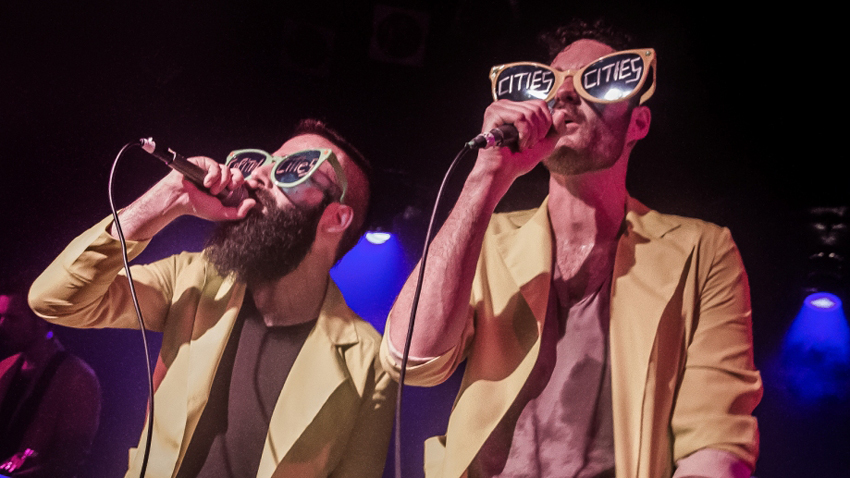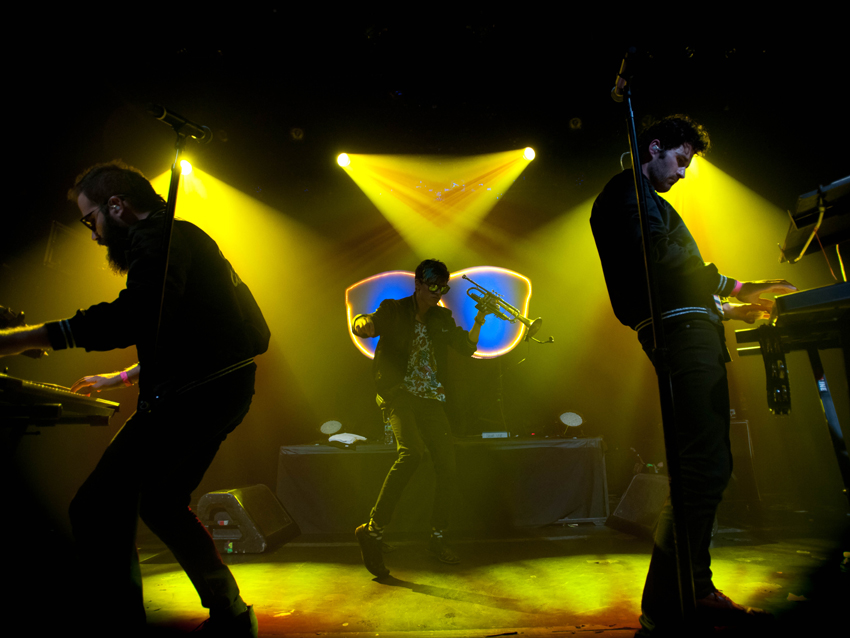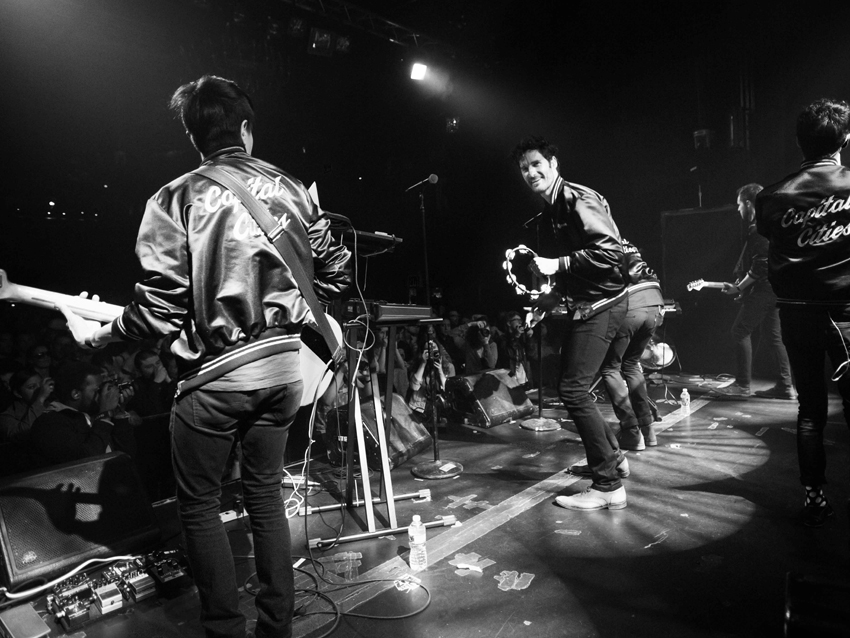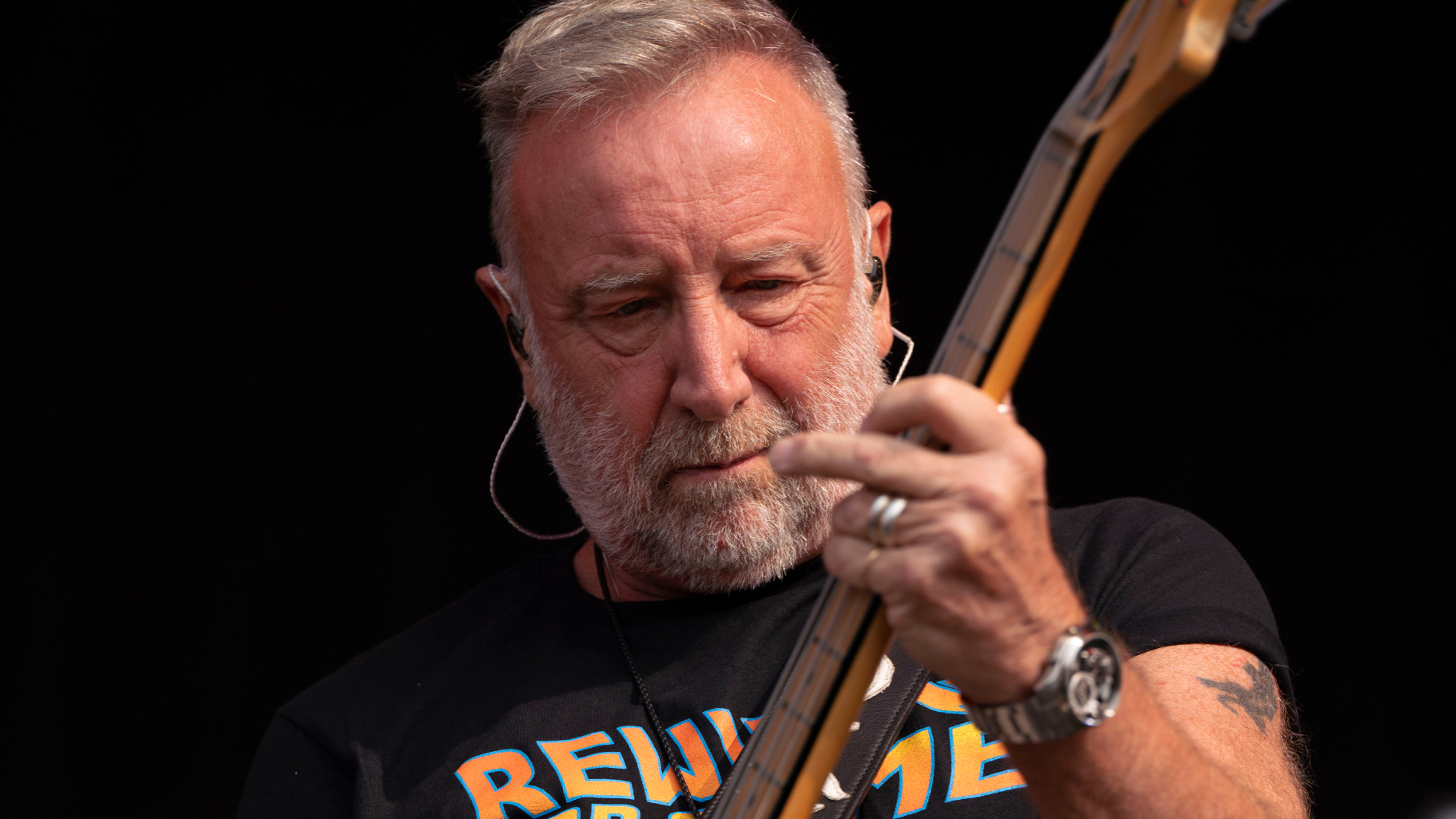
To say that Safe And Sound, the fast-rising single from the LA-based pop duo Capital Cities, is a cavalcade of catchiness would be something of a grand understatement. From start to finish, it's an epic hookfest, a fresh and irresistible one-listen winner that buries itself in the thicket of your senses and stays there.
So it's a little surprising, then, to realize that the track, which will be featured on Capital Cities' debut album, In A Tidal Wave Of Mystery (4 June), has actually been hanging around a while: it was the first cut on the band's 2011 self-titled EP. "It's a little strange seeing what's happening," says singer-keyboardist Ryan Merchant, who founded Capital Cities with co-singer and keyboardist Sebu Simonian in 2009. "This isn't the first time that a song had a slow build before it takes off. I just know that we're thrilled. It's pretty exciting."
Unlike some synth-based acts, when Merchant and Simonian hit the stage for their live show, they don't stand at their keyboards, with heads bowed and feet planted into the ground, like air-traffic controllers; the two kick up their heels and throw one of the sweatiest dance parties around. "People come to a concert to let loose and have a good time," says Merchant. "Sebu and I have no problem being entertainers. "
During a stop on the band's Dancing With Strangers tour, Merchant talked to MusicRadar about the group's synths and software, their love of Michael Jackson, the Bee Gees and Pink Floyd, and how Safe And Sound came together.
Safe And Sound is pretty remarkable for its sheer number of hooks: You have the dual vocal melody hook in the verse, the chorus, the synth bass line, the trumpet part - every part is a monster.
[Laughs] "Hopefully so, yeah! It started out as a one-minute piece of music that Sebu and I wrote, and we had the octave bass thing. But it was completely different at first; we probably went through 10 different versions before arriving at what it is now. In those previous versions, there was no trumpet. It was a synth line at first, but by the end we realized that the melody for that part was great, but it needed to be different. It needed a new sound to take it to an epic level, so we came up with the trumpet. That's what gave the moment more gravitas, if you will.
"All of the hooks in the song were written extremely fast; arranging everything in a certain way was what took the most time. Plus we knew we had to work out the sonic structure so that it all hit with the right impact. It probably sounds effortless, but it really wasn't. A lot of thought and trial-and-error went into it."
Get the MusicRadar Newsletter
Want all the hottest music and gear news, reviews, deals, features and more, direct to your inbox? Sign up here.
You have a live trumpet player on stage, but what about on record? Is it live or electronic?
"It's a real trumpet on the recordings; a guy named Brian Warfield recorded it. There's still a lot of effects on it, and it's mixed in a certain way, so it might be hard to tell if it's real or not."

Simonian (left) and Merchant (right) on stage at New York City's Irving Place, May 2013 © Jason Sheldon/The Hell Gate/Corbis
The band's dual vocal approach already feels like a signature sound. How did that evolve?
"That was a by-product of the fact that Sebu and I are both singers. We were both lead singers in bands before Capital Cities. We started working together on TV commercials and were writing these songs, and so we felt like we needed to start a band. Both of us wanted to sing, and when we started doing it, it sounded good to just have two lead singers. There's something similar about the timbre of our voices, yet when they're mixed they create this new, interesting kind of univoice."
When you and Sebu met through Craigslist, were you thinking about a band at all, or did you guys get together simply to work on syncs?
"No, I wasn't thinking of a band at all. I was mainly looking for somebody to help me produce some songs that I'd written, basically for a solo project. I just wanted to have some sort of product in hand. I saw Sebu's ad on Craigslist, which was the one and only ad he placed, and I went through his website. I saw that he had produced a bunch of bands, and I watched a couple of videos of him performing, and I really connected with his songwriting style. I felt like he was a kindred spirit in his approach to melody and chord progressions - that kind of thing.
"We got together, and instantaneously we had a great chemistry. We started working on my songs, and very soon after I fell into this jingle writing business. I asked him if he'd like to collaborate with me on that, and that's what we did for a while. Eventually, we had a bunch of songs and started Capital Cities."
When people form bands, they usually have some sort of template in mind. There's a common ground - "We want to be like Metallica" or whatever. What was your template?
"It's funny, because when we first formed the band and did a few shows, we weren't electronica at all; it was all live. We thought that was the direction we wanted to go in, to have live drums and two guitars, bass, all of that. Soon afterwards, we realized that it was harder to rehearse with a bunch of people in the band, but we also wanted to explore producing the songs in more of an electronica context.
"By doing this, it allowed us to go out and play smaller shows, just the two of us. We could perform with backing tracks and sing over them, which was kind of liberating. Over time, though, we've started to incorporate more instrumentation back into the project. Now we have a live bass player, a guitarist, live trumpet - eventually, we'll probably bring back the drums."
I was going to ask about that.
"Yeah, we'll do it when it sounds right. I think we'll do it. We want to wait till we're in the right venues. Unless you're playing bigger venues consistently - like Irving Plaza - the live drums can overpower the mix a little bit. Drums are loud, cymbals are loud. We like the cleanliness of the sound we get right now."
There's a very smooth '70s R&B vibe to the song Kangaroo Court. Are you and Sebu fans of that era?
"Yeah, we both love a lot of, for lack of a better term, funkier, more rhythmic music, stuff that has cool basslines. That song is one of our slower jams, I guess. But sure, we love Motown and Stevie Wonder. Jazz, too - that plays into our music a lot."
How does Pink Floyd fit into it all? I love your cover of Breathe.
"I'm a big Pink Floyd fan, but Sebu is a diehard, obsessive Pink Floyd fan. He would probably cite them as one of his primary influences. What he loves about them is how they explored the psychedelic side of music, which our stuff doesn't really have - we're more straight-ahead pop music in a lot of ways. Adding this sort of dreamy trumpet to some of our songs is, to me, a direct result of listening to Floyd. It's a spirit we get from them, a drive to experiment and not play by the rules."
What was involved with Andre 3000 guesting on Farrah Fawcett Hair?
"Our manager reached out to him and sent him the track. Andre listened to it, loved it and said that he was down for doing a verse on it. Conceptually, the reason why we went after him was because the song is all about things in life that we find to be undeniably good. Farrah Fawcett Hair, the title of the song, is the ultimate embodiment of something that is unanimously considered to be great. Everyone loves Farrah Fawcett hair. [Laughs] With that in mind, we wanted to have one of the undeniably great rappers busting with the verse. We went after Andre 3000, and before you knew it, he was recording our song. It's pretty amazing."
You and Sebu are particularly fond of the Roland Juno-106. Are synths like guitars? Do the older ones have something special about them?
"To be honest with you, we started using the Juno-106 because it was the only analog synth we had sitting around. Sebu kind of adopted it after a friend left it at our studio. Safe And Sound was the first song we used it on. We brought it out and played these huge pad chords on it, and it was then that we realized we had been missing the analog synth boat. There is something to the sound of the Juno. A lot of times, we'll program parts using software synths, but we'll replace them with the Juno-106. It fits in the mix with a fullness and a richness - it's warmer. I think people can subconsciously hear that."

A tambourine-shaking Merchant on stage at Irving Plaza, May 2013 © Jason Sheldon/The Hell Gate/Corbis
Are there any downsides to using the Juno-106? Because it is old…
"Yeah, well, when you work with software synths, it's so easy to save presets and program MIDI - the user-friendly elements are definitely a plus. The Juno-106 is cumbersome and it can't do all of the things that soft synths can do, but the sound is unbeatable. We use it for core bass sounds and pad sounds. We don't want to overuse it, but it's definitely a big part of the sound."
Speaking of software, what do you use?
"We use Logic - that's kind of our main digital audio workstation. We also use Native Instruments. Oh, and there's this one synth called Minimonsta. That one is great - it's our go-to soft synth. It's got a lot of great old Moog sounds. I like that one a lot."
As a kid, you were obsessed with Michael Jackson -
[Laughs] "Yeah, you could say that."
One can tell from your synth basslines. In terms of sound and structure, they're somewhat reminiscent of the bass parts on Thriller and Off The Wall.
"That's cool. Michael Jackson had so many amazing songs. Sebu and I are totally into him. I have to think that his music rubbed off on us. More than the bass, I think a lot of our guitar parts are very Michael Jackson inspired. We have a lot of funky, picked guitar parts that have a Thriller vibe to them, like on the song P.YT."
You guys are Bee Gees fans, too - you do a great version of Stayin' Alive in the set.
"Yeah, we love the Bee Gees. I'm not sure how we decided on that one, though. We try to cover songs that are somewhat ubiquitous but haven't been done a million times. With Stayin' Alive, there wasn't one that was the seminal cover, so we went for it. The trick is to do something interesting with it, take it apart and reconstruct it. It still has to be recognizable as the song, as Stayin' Alive, but it has to have our own stamp on it. We tried to alter the emotional quality of it; it's a little more serious and dark."
Joe is a freelance journalist who has, over the past few decades, interviewed hundreds of guitarists for Guitar World, Guitar Player, MusicRadar and Classic Rock. He is also a former editor of Guitar World, contributing writer for Guitar Aficionado and VP of A&R for Island Records. He’s an enthusiastic guitarist, but he’s nowhere near the likes of the people he interviews. Surprisingly, his skills are more suited to the drums. If you need a drummer for your Beatles tribute band, look him up.




![PRS Archon Classic and Mark Tremonti MT 15 v2: the newly redesigned tube amps offer a host of new features and tones, with the Alter Bridge guitarist's new lunchbox head [right] featuring the Overdrive channel from his MT 100 head, and there's a half-power switch, too.](https://cdn.mos.cms.futurecdn.net/FD37q5pRLCQDhCpT8y94Zi.jpg)





